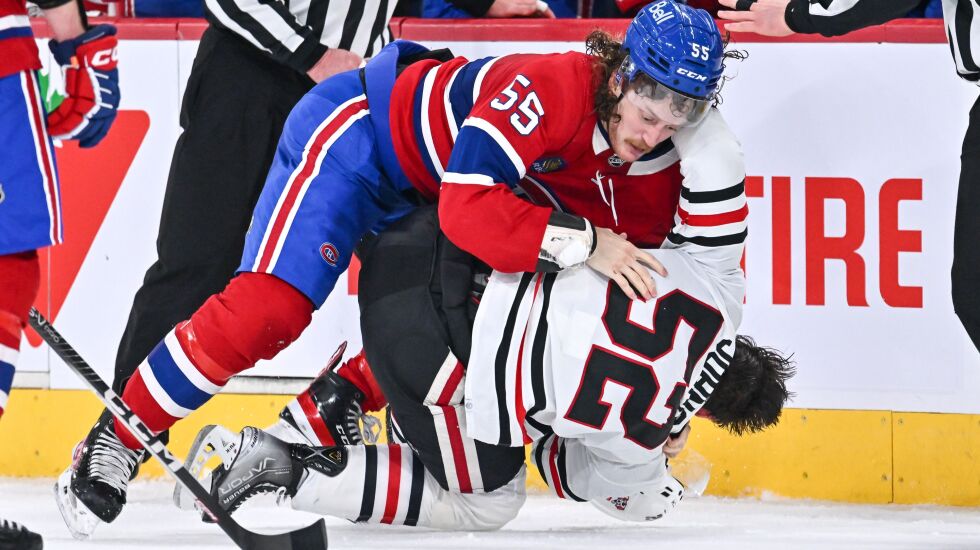
ST. PAUL, Minn. — It turned out Blackhawks center Reese Johnson suffered a concussion in a fight with Michael Pezzetta in the last minute of the Hawks-Canadiens game Feb. 14.
But for several days afterward, that wasn’t clear. Johnson wasn’t sure what to make of what he felt. Was his headache a concussion symptom or just a normal headache? Was his irritability a concussion symptom or just a mood? He struggled with questions like those.
“Anytime you get hit in the head, you’re going to have a little headache, but it lingered for a couple of days,” Johnson said. “I played the next three games. Throughout those games, there wasn’t a lot of time to really think about how I was feeling.”
The schedule intensity was another factor. The Canadiens matchup was the first of four games in six days, with the Maple Leafs, Senators and Leafs again on tap.
“After that [second] Toronto game, I wasn’t feeling like myself off the ice,” he said. “I was actually feeling pretty good on the ice, to be honest. That’s why it was tough. But whenever you step on the ice, it’s easy to block everything else out if you’re feeling a little off. It was off the ice where I noticed most of my symptoms.”
He finally decided to step forward and tell the Hawks’ medical staff, and he was put in concussion protocol Feb. 21.
Not until Saturday’s 3-1 loss to the Wild did Johnson rejoin the Hawks’ lineup, having missed 16 games in the meantime.

His return comes at a critical time with fellow center Philipp Kurashev out with an upper-body injury. The Hawks hope Kurashev isn’t concussed, but they’ll wait to make that determination. Coach Luke Richardson had been preparing to dress only 11 forwards against the Wild before he learned Johnson would be ready.
But missing all those games was difficult nonetheless.
“You don’t realize how much you miss it until you’re actually not playing,” Johnson said.
And that’s why admitting concussion symptoms often requires such courage. Nobody wants to remove themselves from the lineup for an extended period.
“That’s probably one of the hardest parts as an athlete — to make that call for your body and actually reach out to the training staff, saying, ‘I’m not feeling right,’ ” he said. “It takes a bit of courage, for sure.”
Richardson understands that, too.
“Sometimes it does take a little while,” Richardson said. “Some of the symptoms aren’t clear right away. You play so many games that your body is not feeling great [in general] much of the time. To figure that out was responsible and intelligent by Reese. Things like that, to take the proper rest, it’s going to help in the long run.”
While sitting out, most of Johnson’s symptoms were related to his vision. He was able to confide in and get advice from goalie Alex Stalock, who also dealt with vexing vision issues after his concussion earlier this season.
Unfortunately, Johnson then caught a stomach virus from Stalock last week, just as he was preparing to return at the start of this five-game trip. With his immune system possibly weakened by the concussion, he felt — for a week — the sickest he had in years, and he missed another four games as a result.
But his string of problems finally ended over the last few days, giving Johnson the last 11 games of the season to try to add to his season totals of six points and 142 hits.
“[I’ll] just play my game — straight lines, move my feet, be physical — [and] bring that back into the lineup like I know I can,” he said. “And have fun, too. That’s one thing you always need to do.”







